
La rondine, Royal Opera House
A sumptous production of Puccini's unjustly negelcted opera is marred by diva Angela Gheorghiu's fading presence, says John Allison.

The least manipulative, least morbid of all Puccini's works, La rondine, ("The Swallow") remains a rara avis in the opera house. Yet it is a seductive piece, one conceived as an attempt to challenge fellow composer Franz Lehár's dominance of the Viennese operetta scene but which quickly outgrew that milieu and gained operatic depth. In a production as sumptuous as Nicolas Joel's, now revived at Covent Garden by Stephen Barlow with all these impulses again in beautiful balance, its lack of popularity is hard to fathom.
Ironically, given her reputation as one of the operatic world's more manipulative characters, Angela Gheorghiu has owned the title role more than anyone else in the last decade. Her previous portrayals of Magda – who flits swallow-like from her wealthy protector when she falls in love with an innocent young man, only to fly off again when she feels that her past as a courtesan makes her unworthy of him – have counted among the Romanian diva's most subtle and successful performances.
But something is not quite right this time. Fresh from discordant headlines about her former marriage to Roberto Alagna, opposite whom she starred when this production was new in 2002, Gheorghiu overacts, making eyes more at the audience than her on-stage lovers. Perhaps she is compensating for a worrying loss of freshness and bloom in her voice, but she sings cautiously even when she gets past "Chi il bel sogno di Doretta", a cruelly testing way to start the evening. Only a few moments, such as the Act II quartet, find her soaring freely.
Ruggero, Magda's younger lover, is not one of Puccini's most demanding tenor roles, but the part still has its high-lying challenges. Charles Castronovo rises to them elegantly, without fielding all the Latinate tone ideally required. The secondary pair of lovers, Lisette and Prunier, are nicely taken here by Sabina Puértolas (a lively Covent Garden debut) and Edgaras Montvidas. Singing firmly, Pietro Spagnoli judges Rambaldo well and is never over-bearing as Magda's protector.
The Roaring Twenties are evoked with a lavishness seldom seen at Covent Garden these days, yet the designs never overwhelm this subtle piece. Through the muted orchestral colours he draws, the conductor Marco Armiliato shows how Puccini's own nostalgia for Paris – and, by extension, the success he enjoyed with La Bohème – comes across so strongly in this music.
Until July 21
Tickets: 020 7304 4000